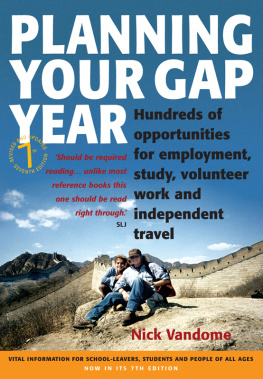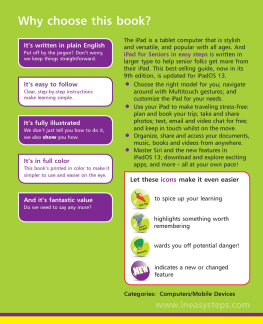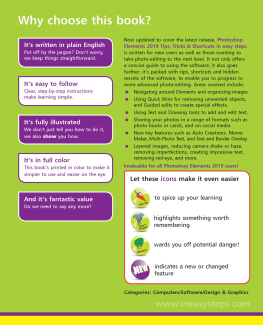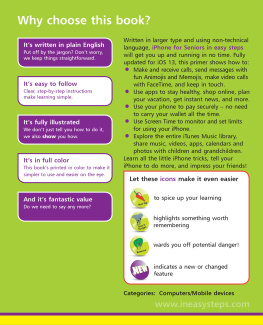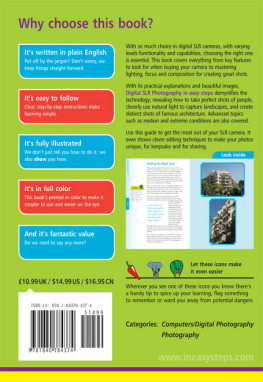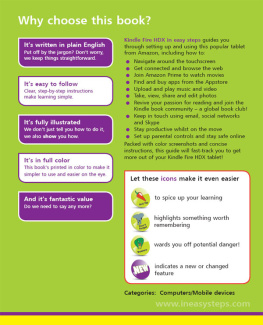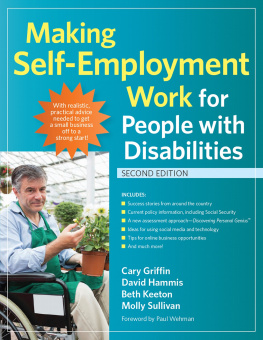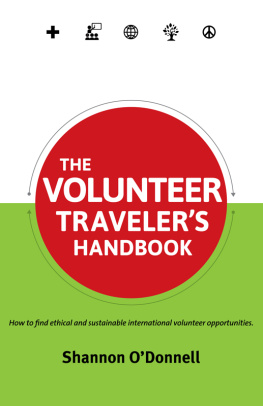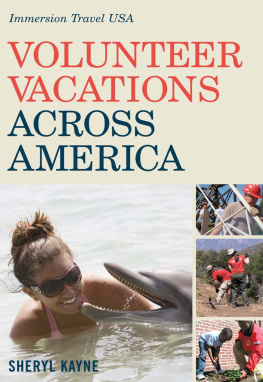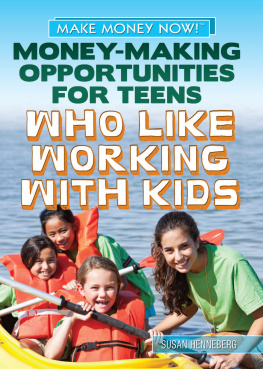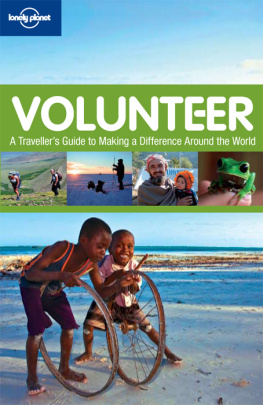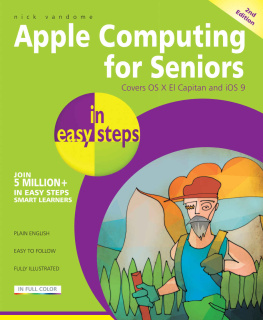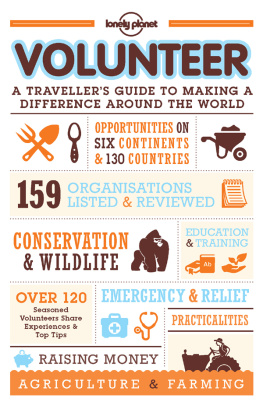Planing Your
Gap Year
If your want to know how...
Getting a Job Abroad
The handbook for the international jobseeker;
where the jobs are, how to find them
Worldwide Volunteering
Hundreds of volunteers organisations for gap year, holiday or vacation projects
Getting into Canada
How to make a successful application for permanent
or temporary residence
Living & Working in America
The complete guide to studying, working or living in the USA
Living & Working in Australia
All you need to know for starting a new life down under
Living & Working in New Zealand
The definitive guide to setting up a new life in the other Down Under

Send for a free copy of the latest catalogue to:
How To Books
3 Newtec Place, Magdalen Road
Oxford OX4 1RE, United Kingdom
email:
www.howtobooks.co.uk
Planning Your
Gap Year
Hundreds of opportunities for
employment, study, volunteer work
and independent travel
7th edition
NICK VANDOME

By the same author
Getting a Job in Australia
Constable & Robinson Ltd.
5556 Russell Square
London WC1B 4HP
www.constablerobinson.com
All rights reserved. No part of this work may be reproduced or stored in an information retrieval system (other than for purposes of review), without the express permission of the publisher in writing.
Copyright 2005 Nick Vandome
British Library Cataloguing in Publication Data.
A catalogue record for this book is available from the British Library.
Fourth edition 1999
Fifth edition 2002
Sixth edition 2003
Seventh edition 2005
eISBN: 978-1-8480-3772-4
Cover design by Baseline Arts Ltd
Produced for How To Books by Deer Park Productions
Typeset by Kestrel Data, Exeter
Printed and bound by Cromwell Press Ltd, Trowbridge, Wiltshire
NOTE: The material contained in this book is set out in good faith for general guidance and no liability can be accepted for loss or expense incurred as a result of relying in particular circumstances on statements made in the book. Laws and regulations are complex and liable to change, and readers should check the current position with the relevant authorities before making personal arrangements.
Contents
Kibbutz work
Golden rules of travel
Preface
to Seventh Edition
The world, and the world of travel, is changing continually. The terrorist attacks in the United States on 11 September 2001 continue to cast a shadow around the world and this is still an issue for anyone considering travelling abroad. These attacks have highlighted not only the possible dangers of international travel, but also the random nature of these acts. Undoubtedly there will be more attacks of this nature in the future but it is impossible to predict when, or where, they will occur. This can be a considerable worry for the independent traveller. However, no-one should be deterred from travelling solely for this reason. Thankfully, incidents like this are few and far between and, while travellers should be aware of the potential dangers, it is important for people to continue to seek out new experiences and different cultures and ways of life. Achieving a better understanding of communities around the world is an important way for everyone to break down barriers and misconceptions.
One of the great changes and improvements to the travel business in recent years has been the continuing progress of the Internet. It is hard to find any aspects of our lives that are not touched by the World Wide Web or email, and travel is one area that has benefited considerably from this technological trailblazer. The most obvious benefit is the proliferation of cut-price travel agents that are appearing on the Web. There are a whole host of these and they offer genuine and dramatic reductions on airline tickets. Another area of interest for the independent traveller is the use of personal and mobile email addresses. These enable the traveller to access emails from home, wherever they are in the world, as long as they have access to a computer. The internet is a valuable tool for the independent traveller and it should be used before going and also while away from home.
A book of this type relies on the views and comments of people who are involved in travelling and working around the world. Over the years a number of people have been kind enough to write to me with their comments and experiences. I am always grateful for this type of feedback and any information can be sent to the author c/o How To Books Ltd, 3 Newtec Place, Magdalen Road, Oxford OX4 1RE.
Nick Vandome

Preparing Before You Go
In some ways the hardest part about planning a year out is the initial decision to take the plunge and pack your bags. However exciting it may seem there will always be doubts and apprehensions leaving family and friends, foregoing stability and security for unknown places, and the thought that you may never see your pet goldfish again.
These doubts are perfectly normal and it would be more worrying if you did not occasionally have second thoughts. However, you have to weigh these up against the opportunities you will miss if you stay at home and resist the temptation to pack up and go. The doubts you have as you stare at the ceiling in the middle of the night rarely look as threatening in the light of day. Although a year abroad is a big step things will be remarkably similar when you return and, after a couple of weeks at home, you may be itching to leave again.
Despite this, a year out is not for everyone and it is a decision that should be taken seriously and not in an offhand, whimsical fashion.
WHY DO IT?
Traditionally a year out is taken for three main reasons:
A transitional year between school and university.
To gain wider experience before entering the job market.
An irresistible case of wanderlust.
After school
The first opportunity most people will have for a year out will be when they finish school. After years of calculus, homework and school dinners the prospect of time abroad is an exciting one. However, it should be looked at as an opportunity for development and not just an excuse to escape from studying for a year.
Careers officers prefer pupils taking a year out between school and university to pursue a structured approach rather than a year of aimless wandering. Donald MacDonald, the careers master at George Watsons College in Edinburgh, takes a great interest in pupils who are contemplating a year abroad and in general he steers them away from the freelance approach: We tend to take the university line; that is we prefer pupils to do something constructive as opposed to a year in the Mediterranean with a guitar and a bed-roll. This is good advice and it is worth remembering that you can undertake a second year abroad once you have completed any further education that you choose.
Next page
